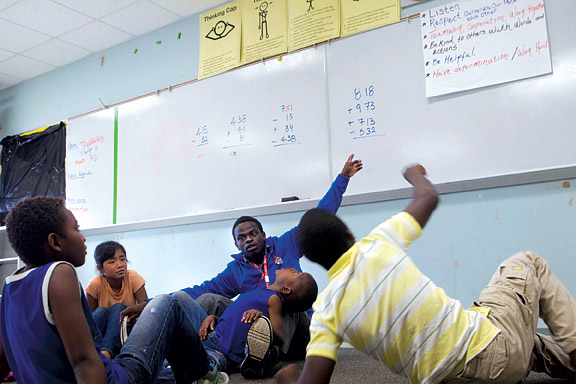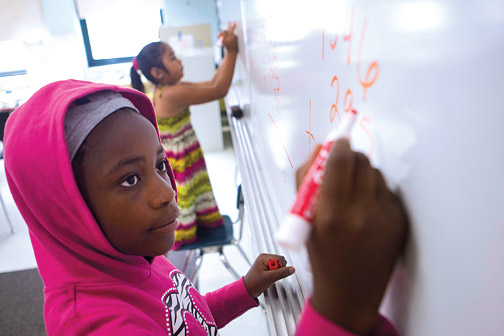On a mid-July day this summer, the second floor of South Providence’s Sgt. Cornel Young Jr. Elementary School teemed with fifty-five children and their counselors, most of them Brown students. In one classroom, eleven- and twelve-year-olds studied symmetry, dividing various shapes in half. Down the hall, seven-year-olds raced to see who could be first to write an odd number or draw a triangle on the whiteboard.

The fifty-five children who attended the BRYTE camp this summer ranged from seven to twelve years old and were fleeing such difficult places as Eritrea, Nepal, Burundi, Burma, and Senegal. For six weeks, they spent their mornings in literacy and math classes; afternoon activities included dance, arts and crafts, and science projects. They swam at a local YMCA, picked blueberries, and took field trips to the Providence Children’s Museum, the RISD Museum of Art, a Pawtucket Red Sox game, and even the local landfill, where they got a lesson on recycling.
“At camp,” codirector Sophie Mc-Kibben ’16 says, “they learn that learning can be really fun and they can be with kids their own age and level.”

The camp helps kids socially, too, says Alan Flam, director of advising and community collaborations at Brown’s Swearer Center for Public Service, which oversees the BRYTE program. School can be especially isolating for refugees, he says, and camp is a place where they feel secure. “The students walk around the spaces and participate in the activities with a feeling of safety and an ability to participate that I don’t think they always feel during the course of the academic year,” he says.
Counselors assist campers’ families, too. “It’s something that’s
missing from a lot of other programs and something that BRYTE does very
well,” says Cathy Fox, an ESL teacher in Central Falls who helped
develop the summer curriculum. Veneranda Baguma, a refugee from the
Democratic Republic of the Congo, sent her three children to the BRYTE
summer camp. “I am grateful because here at home there is no place for
the kids to play. It’s not safe outside and inside there’s no room.
It’s also good because they are learning English and math. We are old
and don’t benefit from learning as much. But they are learning, and
it’s good, because this is their country now.”




